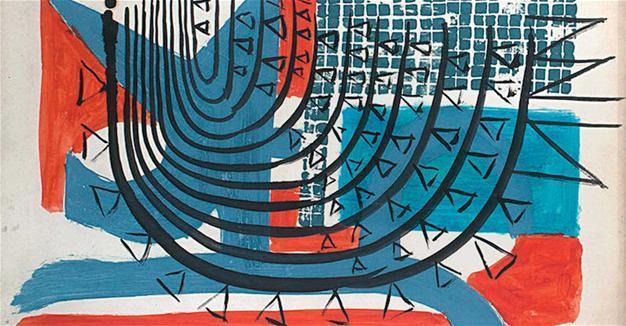Moscow show provides glimpse into modern Turkish art
ISTANBUL

The State Museum of Oriental Art in Moscow has opened a special exhibition project titled “The Bilge Collection” until April 2, providing a glimpse at contemporary Turkish art in the Russian capital.
The exhibition aims to provide an insight into Turkish art through the eyes of Muhsin Bilge (1944 - 2014), a renowned Turkish collector and a passionate lover and patron of art.
Curated by Irina Batkova, the exhibition presents a selection from Muhsin Bilge’s private collection and features 65 works by 28 artists. The works include famous artists such as Bedri Rahmi Eyüboglu, Celal Tutant, Ergin İnan, Fahrelnissa Zeid, Fikret Mualla, İbrahim Örs, Kemal Önsöy, Komet, Mehmet Güleryüz, Nejad Melih Devrim, Özdemir Altan, Sabri Berkel, Şükriye Dikmen and Zeki Faik İzer, as well as young artists such as Serkan Yüksel, Arda Yalkın, Beyza Boynudelik, Füruzan Şimşek, Haluk Akakçe, Mustafa Özel, Volkan Kızıltunç and many more.
At the opening ceremony of the exhibition on March 6, Turkish Ambassador to Moscow Hüseyin Diriöz said the collection consisted of selected works that Bilge had collected throughout his life with the support of his family.
“Since his death in 2014, the collection has been run by his children Aslı and Ali. The efforts and collaboration between his son Ali and the State Museum of Oriental Art have no doubt played a big role in displaying these artworks to Russian people,” the ambassador said.
Ali Bilge emphasized that Turkish art was going on display in Russia for the first time since the 1930s. “After the exhibition of artists like İbrahim Çallı, Salah Cimcoz and Bedri Rahmi on Dec. 31, 1935, we are once again sharing Turkish modern and contemporary art with Russian people. We hope that we will not wait another 82 years to share such an artistic accumulation. In this sense, the Turkish-Russian Cultural Year, which will be held next year, has a very important meaning.”
“Although this exhibition does not claim historical completeness, it represents artists of several generations who laid the foundations of the stable presence of Turkish contemporary art on the artistic world map,” Batkova said. “There are many different ways by which the Bilge collection may be presented. And it is yet to be thoroughly investigated and interpreted. This particular selection is dedicated to Мuhsin Bilge’s passion for collecting art and his personality as well as on his heirs Ali Kerem Bilge and Aslı Bilge, who have followed in their father’s footsteps for 30 years. It displays some of the Bilge family’s favorite artists. Their artistic works are accompanied by letters, sketchbooks and different documents which tell stories not only about the artists’ lives but also about their relations with Мuhsin Bilge. Bilge’s portraits come as an interesting attestation of the true passion for art that the artists from different generations and their patron have shared. Those portraits also show us that the artists considered Muhsin Bilge not only their patron but also their inspirer and accomplice in their endeavors to interpret the world and human relations.”
Collector of objects Muhsin Bilge started his art collection in the early 1990s, after being an avid collector of objects all his life. In time, his notary office became a legendary place in Istanbul. Known as a small intellectual oasis in the city, Bilge’s notary office’s visitors struggled to find their way to his work desk as they stumbled across all kinds of paintings, sculptures and drawings.
The collector met artistic friends every day, even on busy work days. Because he worked as a public notary, Muhsin Bilge spoke of his notary office as the “most visited art gallery in Turkey.”
While making a conscientious effort to collect artworks from all different periods of each artist, he also amassed their notebooks, sketches and correspondence as a window into their practice.
 The State Museum of Oriental Art in Moscow has opened a special exhibition project titled “The Bilge Collection” until April 2, providing a glimpse at contemporary Turkish art in the Russian capital.
The State Museum of Oriental Art in Moscow has opened a special exhibition project titled “The Bilge Collection” until April 2, providing a glimpse at contemporary Turkish art in the Russian capital.